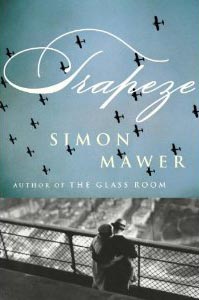The Prisoner's Wife by Gerard Macdonald
 Friday, May 11, 2012 at 7:25AM
Friday, May 11, 2012 at 7:25AM 
Published by Thomas Dunne on May 8, 2012
The Prisoner's Wife is a better novel than the blurbs that promote it, with their trite phrases like "pulse pounding" and "ripped from the headlines." Gerard Macdonald's story is in some respects familiar, but he avoids clichés while building a plausible, politically astute plot that is propelled by strong, troubled characters rather than mindless chase scenes and tired shootouts. Still, there are enough well-written action sequences to heighten tension while moving the story at a steady pace.
Shawn Maguire, an alcoholic and sex addict, on an indefinite suspension from his position with the CIA, is living on the English estate where his wife is buried. Flash back to 2000, when Maguire gets on the wrong side of the CIA's Calvin McCord, whose daddy used to run the Agency. Maguire's boozing, failed marriages, and taste for married women lead to his professional downfall, a fate that McCord promotes. In 2004, Ayub Abbasi, once a liason between the CIA and Pakistan's Inter-Services Intelligence agency, hires the blacklisted Maguire to obtain information about Darius Osmani, an Iranian research scientist who, with a group of Taliban fighters, stole papers from Abbasi's office in Kandahar. Osmani also claims to have discovered a portable nuclear weapon in Afghanistan. Abbasi wants Maguire to find Osmani (who has disappeared) and to learn the location of the weapon. Although Abbasi and Maguire don't know it, about a month earlier two CIA agents captured Osmani in Paris.
Maguire goes to Paris in search of Osmani and finds Danielle, Osmani's wife. Maguire, of course, has a thing for Danielle, although he's still carrying a torch for his dead wife. Together with Danielle, Maguire travels to Morocco and Cairo and Peshawar in search of Osmani. Flashbacks become a regular feature as the story moves forward, supplying the mortar that binds together Maguire's unsteady life.
Like his alcoholism, Maguire's belief that his deceased wife still occupies the house they shared is an old and obvious device to depict the depths of Maguire's tormented soul, but Macdonald doesn't oversell those character traits. Maguire's fretting about his "addiction" to sex, on the other hand, becomes a little silly. Although he participates in too many angst-ridden conversations, Maguire is, for the most part, a well-conceived character, albeit overly reminiscent of the broken figures Graham Greene invented for his spy novels decades ago.
The Prisoner's Wife picks up momentum as it moves toward a surprising climax. Some aspects of the story Macdonald tells are less surprising -- they are, in fact, so familiar that much of the plot seems uninspired. The story is engaging but occasionally stretches the reader's capacity to suspend disbelief. It seems improbable that a blacklisted agent would so easily track a CIA captive as he is rendered from one secret prison to another. It is equally improbable that he would bring the detainee's wife on his dangerous mission, but pairing an aging spy with a young, beautiful woman is a standard feature of espionage stories and Macdonald makes it work despite its implausibility. Besides, she's integral to the story (as beautiful women always are in novels like this).
There are shades of noir in Macdonald's understated prose. Dialog is sharp. Macdonald has a tendency to overuse certain phrases (heavy people move "with surprising speed") but not so often as to become annoying. The plot takes a more accurate view of global politics (as well as inter- and intra-agency politics) than many thrillers manage. Readers who prefer a less jaded view of the American intelligence community, those who don't believe that intelligence analysts were subject to political manipulation post-9/11, those who look for clear distinctions between the good guys and the bad guys, and those who want to believe that the United States never errs, might want to find their reading pleasure in authors who are less grounded in reality. I found it refreshing to read a nuanced novel about terrorism that didn't feature a former Ranger single-handedly saving the nation from cartoonish evildoers.
Macdonald is no Graham Greene, but he is a welcome addition to the ever-expanding field of British spy novelists. The Prisoner's Wife is an intense, entertaining novel in the Greene tradition of dark, morally ambiguous spy stories.
RECOMMENDED
 TChris |
TChris |  Post a Comment |
Post a Comment |  Gerard Macdonald,
Gerard Macdonald,  Recent Release,
Recent Release,  spy in
spy in  Thriller
Thriller 


